2017-18 Events
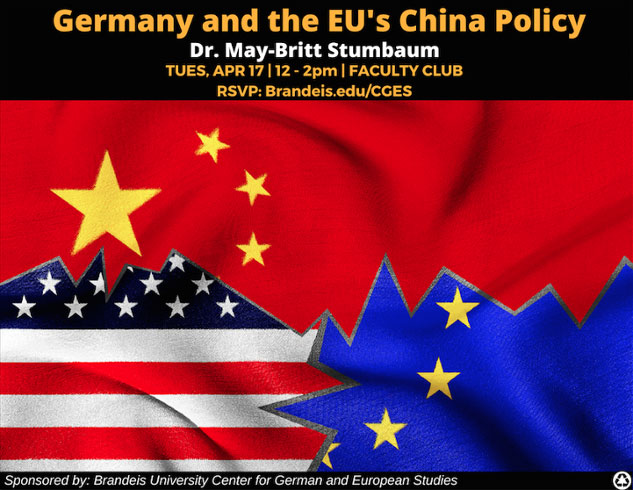
April 17, 2018
Dr. May-Britt Stumbaum
The talk provided a short overview of the current state of play of Germany’s and the EU’s policy vis-á-vis China as a global actor and a rising military power, and analysis and assessments of China’s foreign and security policy from a European/German perspective. It also addressed possible areas for cooperation and competition when dealing with China — on China and on cooperation/competition with China on regional and global challenges.
Dr. May-Britt U. Stumbaum is director of the NFG Research Group "Asian Perceptions of the EU" at the Free University of Berlin, and team leader of the EU’s Asia Pacific and Research Network (#APRAN) by Konrad Adenauer Foundation, Chatham House and Clingendael. #APRAN provides tailor-made briefings by Asian experts for EU policy-makers. Dr. Stumbaum previously served as executive director of the China and Global Security Program at SIPRI, Fritz Thyssen Fellow at WCFIA Harvard, and in senior positions at the German Council on Foreign Relations and at Berlin Partner.
Bridging policy and academia, she worked at renowned think tanks in Europe, the United States and Asia (CHN, TWN, AUS, NZL), the EU Delegation to China, and still serves regularly at the German Ministry of Defense as a reserve officer (Air Force Major) in the political unit. She is editor of the blog "The Spear: Security and Politics in Europe-Asia Relations" and associate editor of European Geostrategy Blog. She is the co-founder and former president of Women in International Security Deutschland (WIIS.de), served as the first female president of the Tönissteiner Kreis e.V. and is a full member at the CSCAP EU Committee of the Council for Security Cooperation in the Asia Pacific.
Dr. Stumbaum graduated from the London School of Economics and Political Science (MSc) and the Free University Berlin (PhD). She frequently comments in the media (CNN, Al-Jazeera, N24 and others) and testified before the U.S. Congress' U.S.-China Economic and Security Committee on EU-China security in 2012.
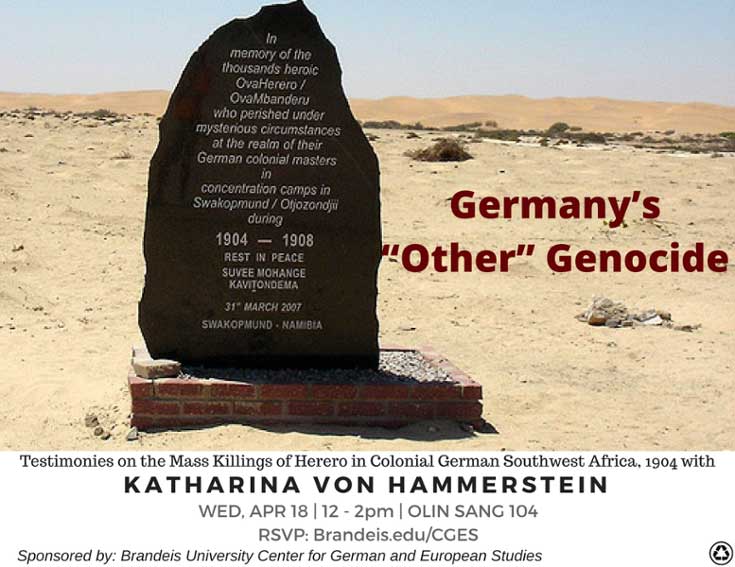
April 18, 2018
Katharina von Hammerstein UConn, Storrs
In 2015, after more than a century, the German government recognized the German-Herero-Nama Colonial War of 1904-08 for what it was: the first genocide of the 20th century. Addressing questions of race and human rights in colonial power relations, and expanding on merely German perspectives, this presentation focused on rare and un(der)researched testimonies of Herero, past and present, on this lesser known genocide in the former colony of German Southwest Africa, today’s Namibia.
Katharina von Hammerstein is Professor of German Studies and Coordinator of the Graduate Certificate in Human Rights at the University of Connecticut. Her 12 book publications and 70 articles are located at the intersections of German literature, postcolonial studies, gender studies, war studies and human rights, with a focus on: gender in literature between the 1790s and 1910s, self-writings by women as political practice between the pre-revolutionary 1840s and the Weimar Republic, representations of Blacks in literature around 1900, and literature and war.
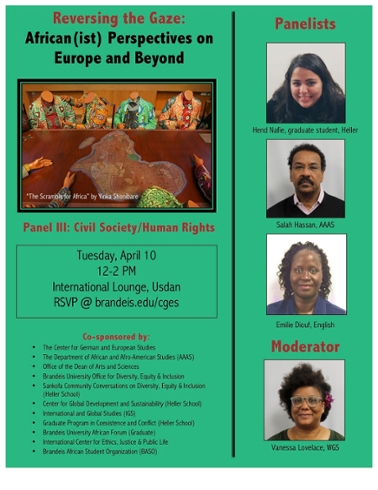
April 10, 2018
Panel III: "Civil Society/Human Rights"
The European "Migrant Crisis" has received significant media and academic attention since 2015 when over one million refugees arrived in Europe. During the same period, thousands of people died attempting to cross both the Sahara Desert and the Mediterranean Sea. These tumultuous events have largely been viewed from the perspective of Europe. In this series, we want to "reverse our gaze" and provide a view of Europe from Africa with the help of Brandeis faculty experts, graduate students at the Heller school, and others by focusing on three key areas: migration; civil society and human rights; and political economy/trade/cooperation/climate change.
Co-sponsored by:- Center for German and European Studies (CGES)
- Department of African and Afro-American Studies (AAAS)
- Office of the Dean of Arts and Sciences
- Brandeis University Office for Diversity, Equity and Inclusion
- Sankofa Community Conversations on Diversity, Equity and Inclusion (Heller School)
- Center for Global Development and Sustainability (Heller School)
- International and Global Studies (IGS)
- Graduate Program in Coexistence and Conflict (Heller School)
- Brandeis University African Forum (Graduate)
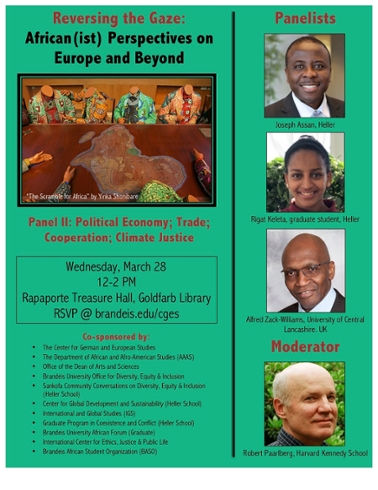
March 28, 2018
Panel II: Political Economy, Trade, Cooperation, Climate Justice
The European "Migrant Crisis" has received significant media and academic attention since 2015 when over one million refugees arrived in Europe. During the same period, thousands of people died attempting to cross both the Sahara Desert and the Mediterranean Sea. These tumultuous events have largely been viewed from the perspective of Europe. In this series, we want to "reverse our gaze" and provide a view of Europe from Africa with the help of Brandeis faculty experts, graduate students at the Heller school, and others by focusing on three key areas: migration; civil society and human rights; and political economy/trade/cooperation/climate change. The talk concluded with a Q & A session with the audience.
Co-sponsored by:
- Center for German and European Studies (CGES)
- Department of African and Afro-American Studies (AAAS)
- Office of the Dean of Arts and Sciences
- Brandeis University Office for Diversity, Equity and Inclusion
- Sankofa Community Conversations on Diversity, Equity and Inclusion (Heller School)
- Center for Global Development and Sustainability (Heller School)
- International and Global Studies (IGS)
- Graduate Program in Coexistence and Conflict (Heller School)
- Brandeis University African Forum (Graduate)
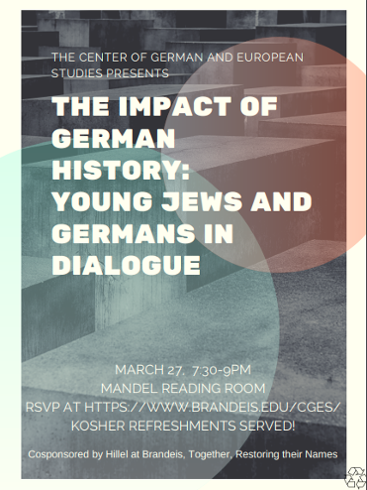
March 27, 2018
As globalization brings our world together in unprecedented ways, it seems counterintuitive that cross-cultural dialogue has not become more commonplace. In this panel discussion, two young Jews and two young Germans discussed the perception and impact of the Holocaust on their respective communities. Drawing from informal experiences and formal education, they interacted to widen perspectives and encourage collaboration in an embodiment of the words of Anne Frank: "How wonderful it is that nobody need wait a single moment before starting to improve the world." It concluded with a Q&A with the panelists.
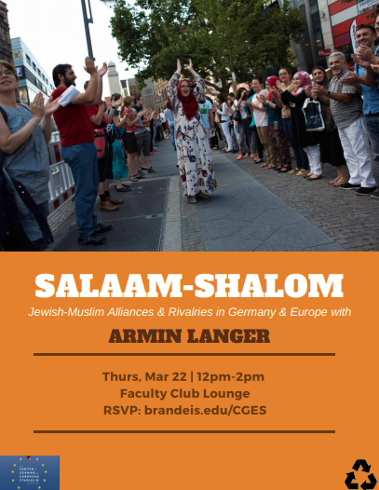
March 22, 2018
Armin Langer discussed his experiences with the Salaam-Schalom Initiative, an interfaith activist group standing for a peaceful co-existence between Jews, Muslims and allies. The group was established in 2013 in Berlin, and now has several chapters throughout Europe. Langer recently published a book on Jewish politics in Germany and will also be discussing his work.
Armin Langer studied philosophy at Eötvös-Loránd-University in Budapest and rabbinical literature at Conservative Jeschiwa in Jerusalem. He lives in Berlin-Neukölln since 2013.
Co-sponsored by Brandeis Hillel and Common Ground

March 23, 2018
Dr. Christine Benz is the training manager at TRUMPF Inc. She discussed workforce development and vocational training.
Christine Benz, DBA, initiated and oversees TRUMPF Inc.'s successful registered apprenticeship program, and promotes dual education among businesses, educators and legislators. She joined TRUMPF Inc. in May 2003, initially working as an engineer in the Laser Development Department, where she developed new laser designs. She then worked as a manager of project engineering in the Customer Service group, where she managed large-scale automation projects. In her curent role as training manager, she is responsible for providing TRUMPF customers with the knowledge they need to operate high-technology equipment successfully as well as for the continuous training and development of TRUMPF employees. She also serves as a member of Central Connecticut State University’s Industrial Advisory Board.
Dr. Benz earned a BS in Micro- and Precision Engineering at the University of Applied Sciences in Munich, Germany, an MS in Technology Management at Central Connecticut State University and a DBA in Organizational Leadership at North Central University.
Co-sponsored by ACG.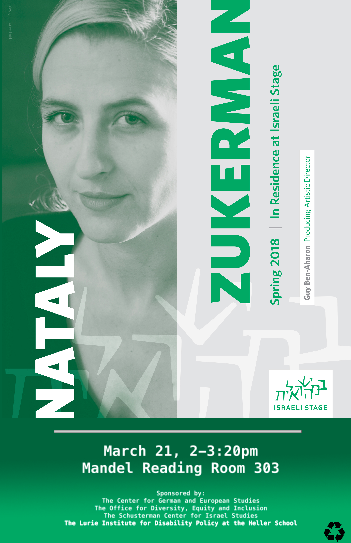
March 21, 2018
Nataly Zukerman is an independent performance artist who makes autobiographical work in the field of disability culture. At age 12, she was severely injured at a youth camp and suffered from a severe neural back injury. In her lecture demonstration she performed pieces from her critically acclaimed performance "The Other Body," and talks about her disability, and about the exclusion of people with disabilities from Israeli society and the Israeli art world. The talk was a part of the course "Breaking Boundaries in Contemporary Israeli Art and Literature."
Nataly also appeared at Tufts University, Boston University, Emerson College, Berklee College of Music and several other venues across Boston.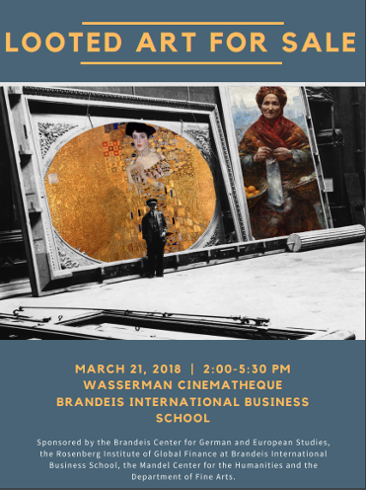
March 21, 2018
RESCHEDULED for Fall 2019
This is an interdisciplinary conference that provides an international perspective on the last 20 years of art recovery. Our invited guests include former Ambassador Stuart Eizenstat; a primary leader in the creation of U.S. restitution policies, Hector Feliciano ’74; Nicholas O'Donnell; Professor Meike Hoffmann; Victoria Reed; Inge Reist; and Lucian Simmons.
The filmmaker, John Friedman, screened excerpts from his forthcoming documentary "Restitution: Art and Memory" on Tuesday evening.
Co-sponsored by:
- Brandeis Center for German and European Studies
- The Rosenberg Institute of Global Finance at Brandei International Business School
- The Mandel Center for the Humanities
- Department of Fine Arts
- National Center for Jewish Film
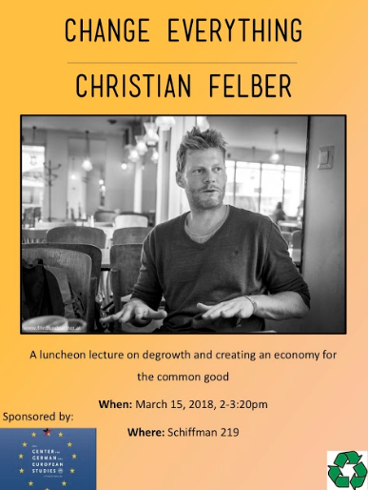
March 15, 2018
A luncheon lecture on degrowth and creating an economy for the common good.
March 25, 2018
The discussion focused on Poland’s new legislation regarding the Institute of National Remembrance and what effects it has on public debate, including Poland's role in the Holocaust. Does this new legislation represent the continual march rightward toward a populist vision of state and fatherland? Or was it simply a gross miscalculation by the ruling party seeking to win support from its base? What does this mean for researchers and scholars working in the field of Holocaust remembrance or Polish history? And, most importantly, will the panel members really spend three years in jail for discussing such topics?
Students, faculty and other guests participated in an interactive conversation about the future of free speech, democracy and historical study in Poland and the wider world.
Panelists
- Natalie Cornett, doctoral student in history
- Jerzy Mazur, alumus
- Laura Jockusch, NEJS

February 28, 2018
Doris Dörrie is one of the most famous living German filmmakers opera producers and authors. Her work includes mainstream comedy successes like "Männer" (Men) as well as socially critical works such as "Happy Birthday, Türke." In recent years, Dörrie has worked repeatedly in Japan, including for Enlightenment Guaranteed, Kirschblüten, Hanami (Cherryblossoms), and her most recent film "Liebe Grüẞe aus Fukushima" (Fukushima, mon Amour).
Dörrie joined us for a Q&A at Brandeis after the screening of "Fukushima, Mon Amour" in Wasserman Cinematheque (Sachar Building/IBS).
Doris Dörrie’s visit is made possible with the support of the Department of German, Russian, and Asian Languages and Literature (GRALL), and the Film, Television and Interactive Media Program (FTIM).
Co-sponsored by Goethe Institut
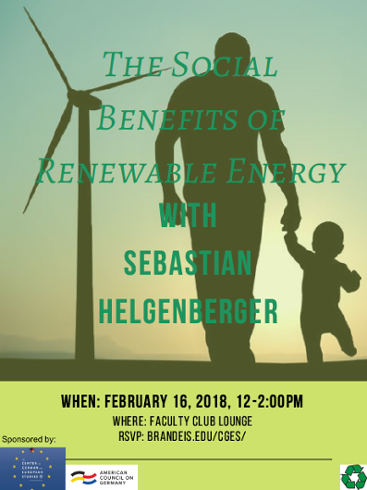
February 16, 2018
Dr. Sebastian Helgenberger leads the Multiple Benefits of Renewables project at IASS Potsdam. Building on experiences with Germany’s Energiewende (transition towards renewable energies) Sebastian and his team, in their research activities and international science-policy dialogues, are putting particular emphasis on the social and economic benefits of renewable energies as drivers of accelerated transitions towards sustainable energy for all.
Allowing for distributed electricity generation, the rapidly expanding renewable energy world is opening up business models for many, including local communities, citizens and citizens' cooperatives. Experiences from Germany, as well as other countries, show how domestic energy policy can shape the enabling environment to seize the social benefits of renewable energy.
After sharing his expertise and insights on sustainable energy, not only for Germany but also in America, Dr. Helgenberger concluded his talk with a Q&A session.
Co-sponsor: The American Council on Germany
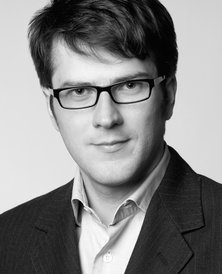
February 8, 2018
Dr. Bernd Sommer is the head of the research division Climate, Culture and Sustainability at the Norbert Elias Center for Transformation Design and Research (NEC) Position.
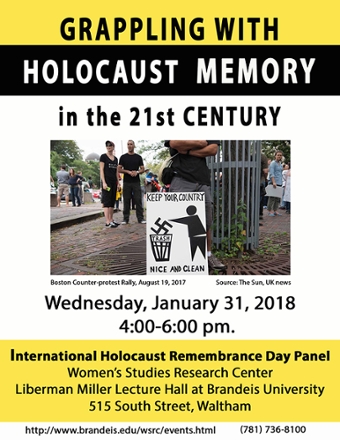
January 31, 2018
International Holocaust Remembrance Day Panel with members of the Holocaust Study Research Group
Women’s Studies Research Center, Brandeis University
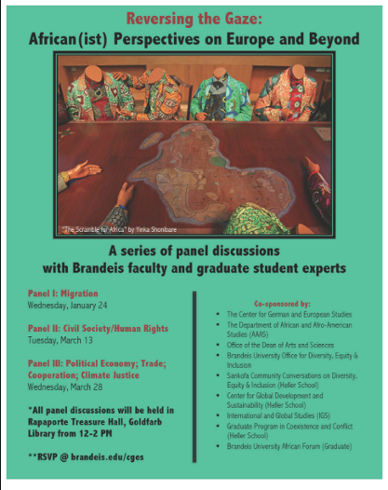
January 24, 2018
Panel I: Migration
The panel consisted of Professor Carina Ray, graduate students Angesom Teklu and Toba Bassey, and Professor Maria Madison was the moderator. The focus of this talk was on migration across the world as well as discussion of important solutions to the current issues. It concluded with a question and answers session.
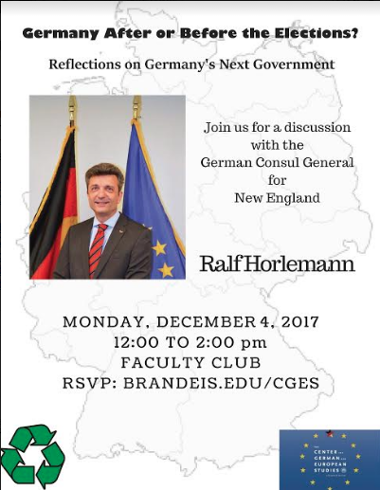
December 4, 2017
with Ralf Horlemann
As you may have read in the news, German Chancellor Angela Merkel, CDU, has not been able to form a "Jamaica" Coalition made up of CDU/CSU, FDP and Greens. On Sunday, Nov. 19, the FDP suddenly pulled out of negotiations for a coalition. This means that for the first time in its history the German government is in limbo. Chancellor Merkel either has to form a minority government or assemble another coalition, but the only other potential coalition partner, the SPD, has said it will not be available for another grand coalition (after support for both CDU/CSU and SPD fell to record lows).
The more likely alternative at this point is new elections, which would happen sometime in March. But would new elections change the results? Would Angela Merkel even run for office again? If not, who would run in her stead? Would voters who came out in large numbers in September be willing to return to the polls in equally high numbers? If not, would the Alternative fuer Deutschland (AfD) win even more seats? Would the FDP benefit from pulling out of what they called an impossible coalition? Or the Greens who were more willing to compromise? What does this prolonged uncertainty mean for Germany and for Europe?
German Consul General for New England Ralf Horlemann, who was at our Campusweeks Debate about the electoral systems in September, returned again to Brandeis to discuss what this means for Germany and Europe. The event concluded with a time of reflection and questions from the audience.
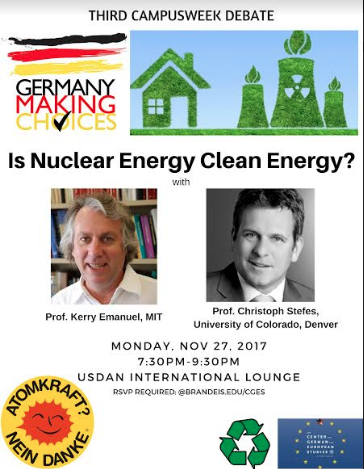
November 27, 2018
with Christoph Stefes and Kerry Emanuel
In our last Campusweeks debate under the theme of "Making Choices," generously sponsored by the German Embassy in Washington, D.C., the focus was on nuclear power. Germany’s anti-nuclear movement is largely credited for the country’s leading role in environmental policy. Since the 1970s German citizens have marched and protested under the banner of ‘Atomkraft? Nein Danke’ (Atomic Energy? No, Thanks). The German Green Party grew out of that movement.
When three Fukushima Daiichi nuclear reactors were disabled following a major earthquake and tsunami on March 11, 2011, hundreds of thousands of people took to the streets in protest — not in Japan, but in cities all over Germany. German Chancellor Angela Merkel, who had won re-election only months earlier with the promise to "exit the exit" from nuclear power that the red-green coalition had decided, changed her mind within days of the events of Fukushima and surprised her own party with the decision to immediately shut down eight of the country’s 17 reactors (all those built before 1981). Germany is now scheduled to take its last nuclear power plant off the grid by 2022.
The attitude towards nuclear power is very different in the United States, which has 104 nuclear reactors up and running and draws about one fifth of its energy from nuclear. Not only the nuclear energy lobby, but even climate scientists like James Hansen view nuclear power as clean energy that is needed to save the planet. Two experts debated whether nuclear energy should indeed be considered clean energy or not.
Kerry Emanuel is professor of atmospheric science at MIT. He was just elected to the prestigious American Academy of Arts and Sciences in April 2017. He is the author of several books, including "What We Know About Climate Change" (MIT Press, 2007).
Christoph Stefes is associate professor of political science at the University of Colorado, Denver. His specialty is political development (authoritarianism and democratization) with a regional focus on the former Soviet Union, especially the South Caucasus and Central Asia. Most recently he co-edited "Germany’s Energy Transition: A Comparative Perspective" (Palgrave Macmillan, 2016).
The debate was lively and concluded with a Q&A session.
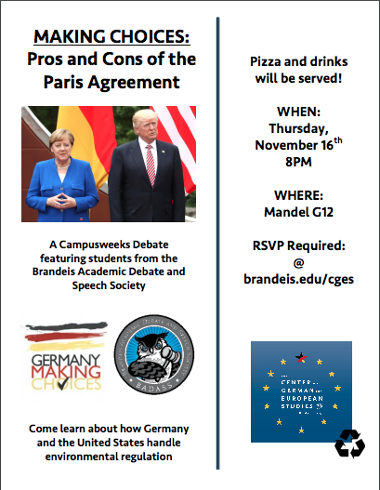
November 16, 2017
with the Brandeis Student Debate Team
There was a lively debate amongst members of the Brandeis Student Debate Team, discussing the role of Germany and the U.S. in the Paris Agreement, as well as the agreement's future. It concluded with a Q&A session.
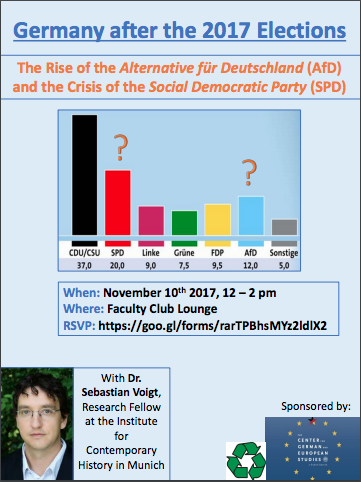
move this image
November 1, 2017
“The Rise of the Alternative für Deutschland (AfD) and the Crisis of the Social Democratic Party (SPD): Germany after the 2017 Elections”
with Dr. Sebastian Voigt
Dr. Sebastian Voigt is currently a research fellow at the Institute for Contemporary History in Munich. He has been a fellow at the Institute for Social Movements in Bochum and a faculty member at the Ruhr University. He is a former Fulbright Scholar who has published widely in the field of Modern European history on such topics as labor, social democracy and antisemitism. His Eric M. Warburg Chapter tour is made possible by the a generous ERP grant from the Ministry of Economic Affairs and Energy.
In contrast to other European countries, a right-wing populist party had not been successful in Germany for a long time. However, in the context of the European economic solidarity measures, the Eurosceptic AfD was founded in 2013. In subsequent years, it managed to get into many state parliaments. The refugee crisis contributed to a further rise of the AfD, changing the political environment in Germany. At the same time, the longest continuously existing German party going back to the 19th century, the SPD, had constituted the core of the German parliamentary system together with the conservative CDU. In 2003, the last social democratic chancellor Gerhard Schröder implemented the largest cuts in the German welfare state of the postwar era, evoking a crisis for the SPD that has been going on for over a decade.
Dr. Voigt gave a brief background on the most recent Bundestag election in September 2017, as well as an understanding of what the AfD party is, who supports them and what their influence is on Germany's politics. The second half of the talk was spent in a Q&A format, where the audience was able to ask follow-up questions and understand what needs to be done next in German politics.
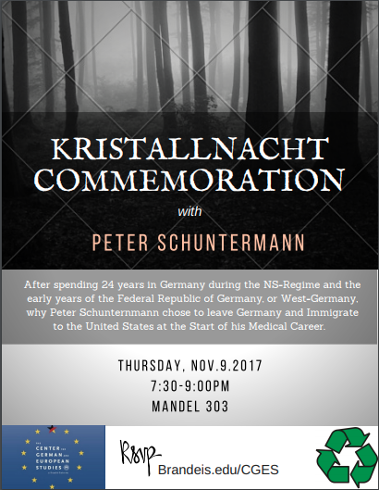
November 9, 2017
with German emigrant Peter Schuntermann
Peter Schuntermann arrived in the U.S. aboard the passenger ship MS Berlin in 1959. He had spent 24 years in Germany during the NS-Regime and the early years of the Federal Republic of Germany, or West Germany. At that time, the young German postwar democracy soon established its policy of reparations with the young State of Israel. Domestically, however, mainstream discourse, public and private, disavowed its then recent NS-past, resulting in a cultural climate now known as conspiracy of silence.
Schuntermann will reflect on what this meant to him as a teenager and young adult at that time, and how he realized that doing the ordinary thing was no longer enough. With a medical degree from the University of Hamburg to his name, a green card and an appointment as intern in a community hospital in Baltimore, he began his first year on American soil. Three years later in Boston, he entered the newly created field of child and adolescent psychiatry. He has been on the staff of Children’s Hospital and Beth Israel Hospital for many years.
Attendees and speaker remembered the events of Kristallnacht and talked about currently world affairs. Mr. Schuntermann shared many stories form his childhood experiences in Germany during the war and attending medical school after the war.
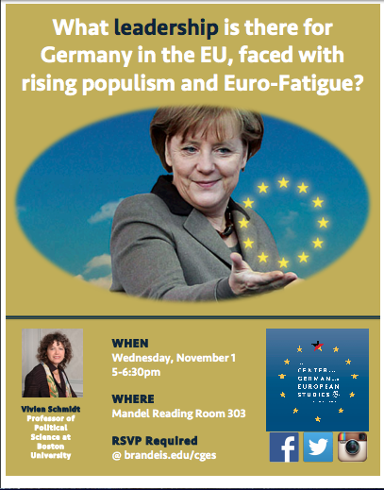
November 1, 2017
with Vivien A. Schmidt Professor of Political Science, Boston University
Professor Vivien Schmidt brought to light the role of Germany’s leadership in the EU in coming years, given a weakened chancellor, a potentially fractious government coalition and a rising populist opposition in the Bundestag for the first time. Amongst the questions discussed were: how will Merkel respond to the new French leader’s ideas about deepening integration, in particular on the Eurozone, and how will she deal with the ongoing refugee crisis and the growing divisions between East and Western Europe?
A lively Q&A session concluded the presentation.
Co-sponsored by the Department of Politics.
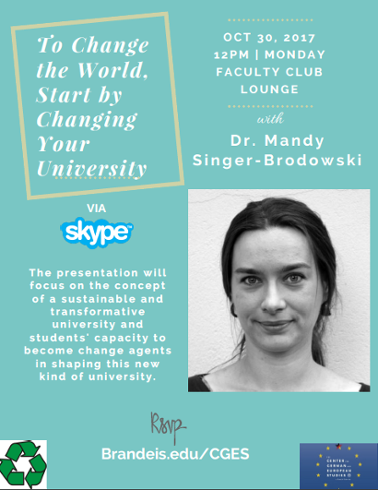
October 30, 2017
with Mandy Singer-Brodowski (via Skype)
In the context of accelerating global sustainability problems, the role of universities in dealing with these problems is becoming more and more important. Universities can foster sustainability solutions through research, education and greening their campuses, as well as giving students the opportunity to get involved in the transition towards sustainability.
While engaged in ongoing sustainability projects inside and outside the university, students can gain the competencies necessary for managing sustainability issues and thereby really make a difference. The presentation focused on the concept of a sustainable and transformative university, as well as students’ capacity to become change agents in shaping this new kind of university.
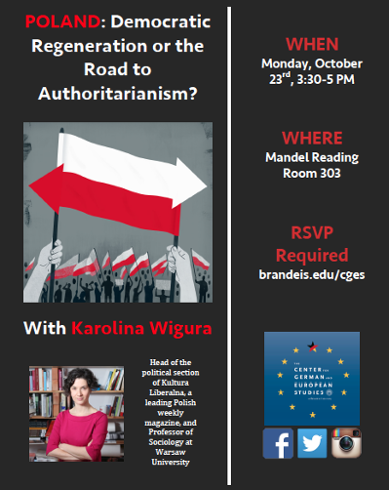
October 23, 2017
Nearly 30 years after its democratic breakthrough, Poland poses a puzzling and fascinating case for scholars, public intellectuals and journalists. Here are a few examples of the expansive questions answered during this presentation: Since 2015, has Warsaw witnessed a "democratic regeneration," as the current government claims, or rather, has it embarked on a road towards authoritarianism? What has Prawo i Sprawiedliwość exactly changed during the past two years? To what extent can we speak of a continuation of the transformation’s logic, and to what extent is this a construction of a new state model by the current Polish government? Is Poland’s current path similar or different from that of Hungary or Turkey?
The talk concluded with a discussion about the reasons this party won the last election and why its popularity is still so high in opinion polls.
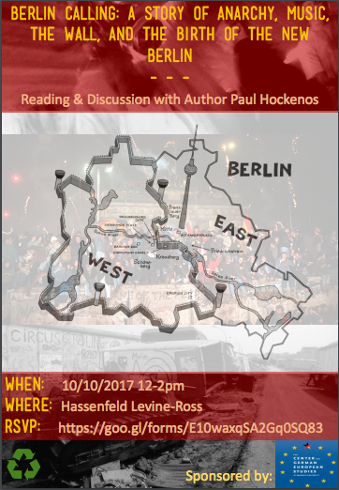
October 10, 2017
Author Paul Hockenos' new book "Berlin Calling: A Story of Anarchy, Music, the Wall and the Birth of the New Berlin" (The New Press, May 2017) is a never-before-told account of the Berlin Wall’s momentous crash, narrated through the divided city’s street artists and punk rockers, impresarios and underground agitators. Hockenos, who lived in Berlin during these exciting times, offered us an original chronicle of 1989's "peaceful revolution," which upended communism in East Germany, and the wild, permissive post-Wall years of artistic ferment and pirate utopias, when protest and idealism, subaltern techno clubs and sprawling squats were the order of the day. Attendees were able to pose question to Hockenos at the end of the presentation.
Co-sponsored by the Goethe Institut Boston.
October 2, 2017
with diplomat Thomas Matussek
The historical promises of European integration, peace, prosperity and a powerful voice in a globalized world, seem to have lost their appeal. War in the east, economic and social meltdown in the south, millions of refugees, xenophobia and nationalism have a led to Brexit, Le Pen and the AfD. This talk grappled with the question of how and if the elections in the Netherlands, France and Germany turned the tide in Europe, and if Europe would ever find its way back to the idealistic visions of its founding fathers.
October 4, 2017
with Eva-Sabine Zehelein
This talk provided an overview of the variety of family formations and the socio-cultural as well as political and legal contexts that characterize German family life today. Through discussion and a Q&A session, selected cases were analyzed. Topics included: marriage, divorce law and rates, single parenthood, abortion, “Ehe fuer alle” (marriage for all), assisted reproductive technologies and new families (ICSI and in vitro, surrogacy and sperm / oocyte donation). Globalization, international exchange of people and human tissue, as well as international medical tourism were also discussed, as they continue to challenge German national law, socio-cultural practices of the (nuclear) family and trigger re(framed) family narratives.
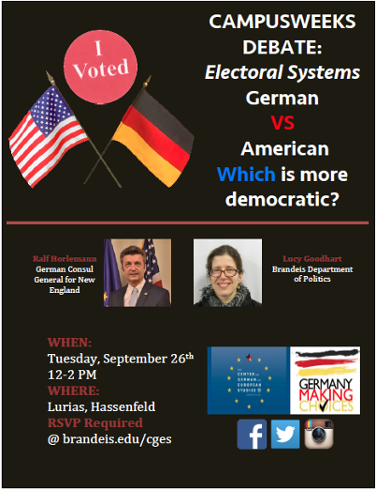
September 26, 2017
with Ralf Horlemann, German Consul General for New England and Lucy Goodhart (Brandeis Department of Politics)
This discussion sought to answer questions such as, which electoral system is more democratic? Why? How well do you really know your own democratic system? What makes a democracy work?
The talk successfully presented a fun, interactive way to learn about how the differences between the German and American election systems, and about the German Federal Election in general, two days after it occurred. Attendees were able to pose further questions and comments to the debate participants.
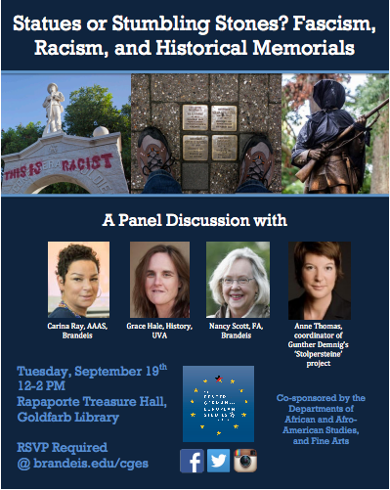
September 19, 2017
with Carina Ray (AAAS), Anne Thomas “Stolpersteine”, Nancy Scott (FA) and Grace Hale (History, UVA), and moderated by Sabine von Mering, Director, CGES.
The Neo-Nazi rally in Charlottesville, Virginia, in August sent shockwaves through the entire country and reignited debate about statues commemorating the confederacy. Drawing on a range of compelling current case studies, both national and transnational in scope, the speakers on this panel explored the questions at the heart of this debate.
Professor Grace Hale, from the University of Virginia in Charlottesville, addressed the removal of confederate and other white supremacist memorials in the U.S., from an historian’s perspective.
Professor Carina Ray (AAAS) discussed the Rhodes Must Fall campaign in South Africa and the UK, and the contested question of memorializing the slave trade in Ghana.
Professor Nancy Scott (FA) spoke about four recent controversies surrounding art and history of monuments — both North and South. During her visit to Brandeis on Aug. 30, Claudia Rankine referenced a new art project memorializing enslaved Africans and marking their sites of enslavement. The project is modeled after German artist Gunter Demnig's project, "Stumbling Stones" (Stolpersteine).
Anne Thomas, long-time colleague of Gunter Demnig, described his unique form of historical memorialization.
Note that an exhibit of “Stolpersteine” was housed in Boston City Hall Sept. 14-28.
Co-sponsored by the Departments of African and Afro-American Studies (AAAS) and Fine Arts (FA).
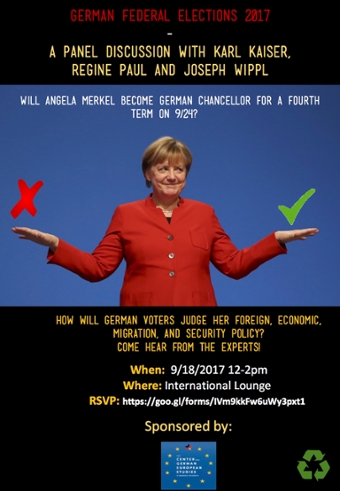
September 18, 2018
with Karl Kaiser (Harvard), Regine Paul (Uni Bielefeld), and Joseph Wippl (BU)
Moderated by Sabine von Mering, Director, CGES
What issues will move German voters in the upcoming federal elections of September 24? Will Angela Merkel become German Chancellor for a fourth term?
CGES invited experts to discuss the general context of foreign and security policy (Karl Kaiser), migration and economic issues (Regine Paul), and possibility of Russian interference (Joseph Wippl).
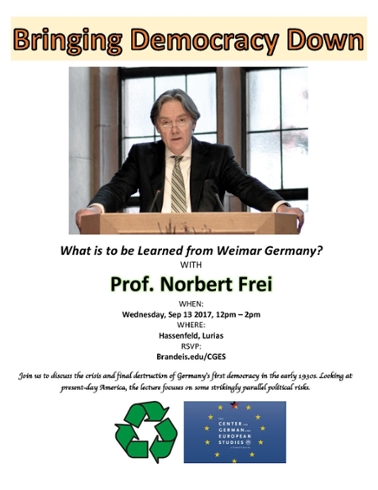
September 13, 2017
with German historian Norbert Frei
This lecture focused on the crisis and final destruction of Germany's first democracy in the early 1930s. It gave special attention to the conservative elites which meant to "engage" Hitler in their fight against the political left and far-left — and at the end were themselves overthrown by the Nazis. Looking at present-day America, there was ample room for discussion about some strikingly parallel political risks.
Prof. Norbert Frei is director of the Center for 20th Century History at Friedrich-Schiller-Universität in Jena, Germany. He completed his doctoral degree at the University of Munich. He has been a Kennedy Fellow at Harvard, and a member of the Institute for Advanced Studies at Princeton. He has also been a guest professor at the Hebrew University in Jerusalem. A major focus of his work has been Vergangenheitsbewältigung, or the ways in which Germans deal with the past. He has written extensively on the rise of National Socialism and the politics of amnesty and integration following WWII.
Co-sponsored by the Warburg Chapter of the American Council on Germany (ACG).
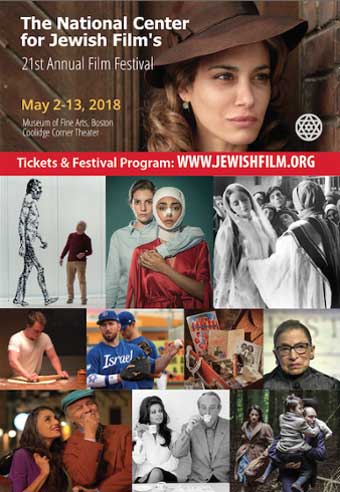
May 2, 2018
CGES is a proud co-sponsor.